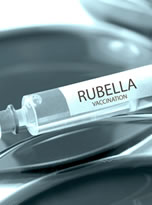Read and report vaccine reactions, harassment and failures.
What are the treatment and prevention options for Rubella?

Practicing cleanliness and good hygiene can assist in preventing rubella infections. This includes:
- Frequent handwashing;
- Use of a hand sanitizer, if handwashing is not available;
- Refraining from touching your face with your hands, unless your hands are clean;
- Covering your nose and mouth with a tissue or sleeve when sneezing or coughing;
- Avoiding close contact with persons who are sick;
- Refraining from using items that may be contaminated by someone who is ill.
There is no treatment for rubella. For most people, rubella is usually mild and therefore treatment is not necessary. Pregnant women who become infected with rubella can be treated with hyperimmune globulin to decrease the risk of transmitting the infection to the unborn child.
Congenital Rubella Syndrome (CRS)
Infants born with CRS, due to maternal rubella infection, can have multiple health issues affecting nearly all organs of the body, including deafness, vision impairments, cardiac defects, microcephaly, neurological abnormalities, developmental delays, and more. Up to 85 percent of infants exposed to rubella in the first eight weeks of fetal development are at risk for CRS. By 12 weeks, the risk decreases to 50 percent and by 20 weeks, the risk is essentially zero. Infants born with CRS will likely require specialized care specific to individual health needs. There was one reported case of CRS in the U.S. in 2019.
IMPORTANT NOTE: NVIC encourages you to become fully informed about Rubella and the Rubella vaccine by reading all sections in the Table of Contents, which contain many links and resources such as the manufacturer product information inserts, and to speak with one or more trusted health care professionals before making a vaccination decision for yourself or your child. This information is for educational purposes only and is not intended as medical advice.



